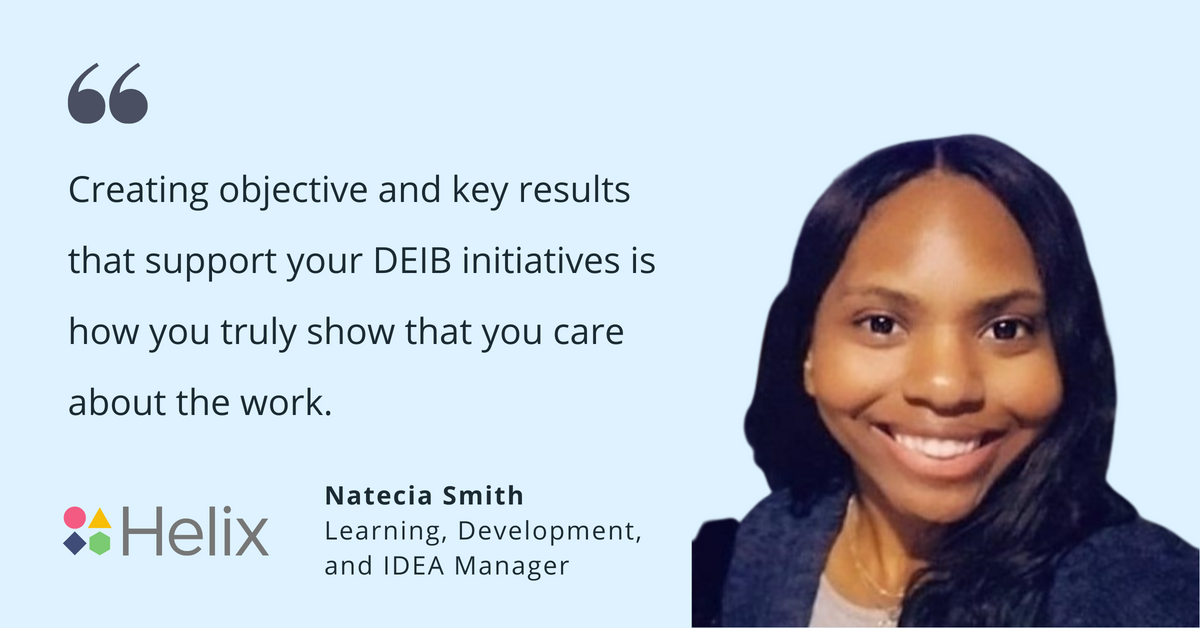Natecia Smith knows that an effective approach to diversity, equity, inclusion, and belonging (DEIB) extends deeper than ticking boxes.
Growing up in a predominantly white area of South Florida, she had to advocate for herself as a child and realized the importance of using her voice for good. “I saw the challenges that my family faced as Jamaican immigrants and decided to volunteer in my community to help others lacking support,” Natecia shares. “As a young woman of color, I was receptive to the needs of others.”
This natural inclination for advocacy carried through to Natecia’s career where she started cultivating corporate consciousness alongside social consciousness. Now, as the Learning, Development, and IDEA Manager at Helix, the leading population genomics and viral surveillance company, Natecia aligns the company's vision with its DEIB initiatives across all levels of the organization.
The cornerstone of her work? Authenticity.
“One of the reasons I accepted the opportunity to join Helix was that I could tell that DEIB is truly integral to how they think about the world,” Natecia confirms.
We sat down with Natecia to explore what it means to be an authentic DEIB leader, along with how you can contribute to a more diverse and inclusive future.
Developing a Holistic DEIB Lens
Natecia describes her journey into the DEIB space as “multipronged.”
From her early days as a volunteer, Natecia witnessed how advocacy is an essential component of providing opportunities to people from underrepresented groups.
“I had various experiences growing up that helped me to understand the value of speaking up for others as well as building a network of people who supported me,” she shares.
This mindset led Natecia to take various college courses related to advocacy and social justice, from women’s studies to masculinity in Tokyo. After graduating, she accepted a position with an educational technology company where she learned how to incorporate DEIB goals into a product roadmap.
“That position opened the door for me to officially work in a DEIB role. I discovered how to move from a product-focused approach to a more holistic DEIB lens,” Natecia shares.
After 12 years with the ed-tech company, Natecia was asked to apply for an opportunity at Helix. “I went through the interview process and ended up really loving the company,” she says. “As a practitioner and person from a marginalized group, I have to be really careful about where I put my energy. I could tell that Helix genuinely cares about reaching marginalized communities through their genomics work. DEIB is embedded into their goals.”
Natecia hit the ground running, building a strategy that incorporates DEIB into all layers of the organization without losing her guiding principle: authenticity.
Authenticity as a Cornerstone
“Authenticity means three things to me. One, tie your aspirations to action. It’s not enough for people to say they care about DEIB,” Natecia starts.
She explains how Helix takes a strategic approach to DEIB by building out data strategies and measurable goals. “Creating objective and key results (OKRs) that support your DEIB initiatives is how you truly show that you care about the work,” Natecia confirms.
Much of her role involves attaching the individual silos of DEIB work happening across the organization to broader, measurable deliverables. She ensures that there’s a shared voice and vision that people can turn toward when making decisions.
“Companies need to align their DEIB plan with wider company goals. If DEIB is not seen as a key component of what makes the company successful, teams will find themselves with fewer resources when times get hard,” Natecia adds.
As for part two of authenticity, Natecia says, “Who you bring to the table matters.” And more than who she brings, she also considers who gets to build the table.
Natecia shares the example of how Helix recently ran a visioning focus group that was opened to the entire organization from the jump. She believes in including all voices when kickstarting projects, building roadmaps, and defining visions that touch DEIB.
“The last prong of authenticity for me is staying wary of too much consensus. As nice as it is to say, ‘We all believe a certain thing,’ there are hundreds of people that we’re representing. When we make that statement and there’s no friction, it’s probably not authentic,” Natecia cautions.
She clarifies that DEIB work can be uncomfortable, and there are certain groups that might feel less recognized when other groups’ experiences are centered.
“Lack of consensus is not detrimental. It means you’re getting to the core of why you’re doing what you’re doing. Without that, you’re likely just checking boxes,” Natecia says.
4 Tips to Grow as an Authentic DEIB Leader
Natecia reminds us that how we authentically influence DEIB is unique to each of us.
“There’s no right or wrong way,” she says. “The only thing that makes the work inauthentic is if you no longer believe your ‘why’ is being honored. If you reach that point, it’s time to reflect on why you’re here, what you want to accomplish, and whether this is the space where you can accomplish it.”
To build your own version of authentic DEIB leadership, Natecia leaves you with these four recommendations:
- Stay true to your opinions. Natecia encourages you to read about the work that’s already being done in the DEIB space, and then decide which parts of it resonate with you. “Ask yourself the hard questions around whether or not you buy into the different viewpoints,” she says. “For you to come to this space authentically, you have to have your own ‘why.’ Understand what you bring to the table, what your biases are, and where you can grow.”
- Decide what authenticity means to you. Natecia stresses that authenticity doesn’t have to equate to full transparency in the workplace. “Sometimes I have discretion over the parts of myself that I bring to work, and that doesn’t make me less authentic. It makes me protective of the pieces of me that I deserve to keep outside of the workplace,” she shares.
- Choose where to invest your energy. While Natecia believes that it’s important to engage in conversations with different points of view, she tells us to assess which conversations are worth our time. “Maybe something happens in the news that impacts you or your community, and it’s not your day to listen to social commentary. It’s okay to choose to be surrounded by like-minded people in those moments,” says Natecia. “However, at the end of the day, you have to understand different perspectives in order to unpack the resistance and present a way forward.”
- Find joy in the work. “It’s easy to get stuck on barriers and challenges,” Natecia says. “That’s a quick way to burn out fast. Instead, focus on how things will get better.”
For Natecia, joy stems from knowing that she’s creating a better world for her niece and nephew. “I see a world where they struggle a little less to prove their value,” she says. “And it makes this worthwhile.”
Join the company that’s making DNA learning accessible and actionable for everyone! Explore Helix’s job opportunities here.



